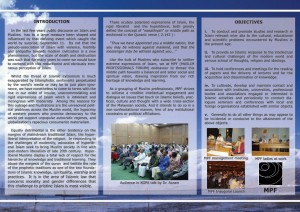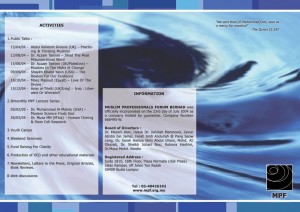A Pawn In The Game
by Dr. Mazeni Alwi
“No!” Naphta continued. “The mystery and precept of the age is not liberation and the development of the ego. What our age needs, what it demands, and what it will create for itself, is – terror”.
(from “the Magic Mountain” by Thomas Mann, 1924)
The first time I met Tourson, a muslim from Xinjiang, I had no inkling of the terrible fate that he had just escaped from. He sat patiently outside my clinic as he waited for me to finish seeing those with regular appointments. He was a gentle, relatively big man who easily broke into a smile, I guess partly to make up for his inadequate English at that time. He was still a little weak and drained from a major operation soon after his arrival in Kuala Lumpur. He had been recommended to me by an old friend who had been instrumental in providing his passage to Malaysia. The circumstances of his situation and his long term plan were not disclosed to me. Tourson had come to ask a favour from me, something so small that I had thought nothing of it. I have written many such letters before – asking for children with heart disease to be exempted from sports, recommending their families walk-up flats on the first floor or explaining why their parents should not be transferred to a place where medical access is difficult. I only became aware how much it meant to him when his family was about to leave Malaysia for Canada some months ago for a final resettlement as “political” refugees.
On that first visit, Tourson showed me a medical report of his little boy named Maimate (he told me this is how “Muhammad” is pronounced and spelled in China) who was still in Urumqi with his wife and 2 older children. The report was mainly in Mandarin but it has enough information in english to give me an idea of his medical condition. At his request, I duly wrote a simple letter stating that his son’s medical condition, a form of a hole in the heart, can be treated at our institution in Kuala Lumpur. He told me that the letter, simple as it may sound, was needed for the authorities in Urumqi to allow his family to leave and join him in Malaysia. I did not know at that time that he could practically never return to Xinjiang. More than 6 months later Tourson came back to my clinic, this time with his family in tow, profusely grateful, his english and bahasa much improved. He seemed to me a keen learner of languages from the progress that he had made, using his time well and taking the opportunity that his new environment provided. What evaded me at that time was the sense of relief from the terrible anguish over the possibility that he might never see his wife and children again. Tourson, with his sparse goatee beard, has more Chinese features, but his wife, with her skin complexion and facial features typical of Central Asian of women of Turkic stock, looked distinctively non Chinese, especially with her muslim dress and head scarf. As for Maimate, the subject of my professional concern, his hole in the heart was fortunately not big, obviating any need for urgent treatment.
I followed them up for nearly 2 years or so after that first visit, making sure that the hole in the heart was not interfering with his growth and physical activities. As his real reason for coming to Malaysia in the first place never crossed my mind, I did not probe too much into his personal background, trying to keep my relationship with him strictly professional. Still, we talked quite a bit about Xinjiang, Urumqi and Islam in China. Having watched a BBC series many years ago made by travel writer Colin Thubron about travels in exotic, remote parts of the world which included his homeland, I have some knowledge of it and harbour a faint wish of visiting. One episode in the series was about the famed Silk Road whose towns and cities owed their existence and importance to that ancient trade route, notably Kashgar, Turfan and Urumqi, which today remain culturally distinct even as westward, forced migration of the Chinese during the cultural revolution has diluted its muslim, central asian character. What I did not know was that despite Tourson’s pride in his city, his people and their Islamic heritage, he could no longer remain there and will not likely see it again. In the climate of post September 11, the “war on terror” has given despots and authoritarian governments a more stretchable excuse to persecute their muslim citizens without having to look over their shoulder. It could even earn them brownie points from the warriors of the war on terror. The peace and security of the world is hardly the objective, much less “the liberation and development of the ego”. To be simply a devout muslim in these times in these places can be a dangerous thing. Getting caught in this very fine net cast by the “war on terror by terror” (coined by Fred Halliday, opendemocracy contributor and professor of international relations at the London School of Economics) sums up Tourson’s sudden change of fortune and exile from his beloved homeland, at least as I had understood it. One reads of stories on human right abuses, unlawful detentions, of families being separated, of wives rendered widows and children orphans, simply because they are muslims who take their faith a bit more seriously, making them a fair game in the war on terror, but seeing them in front of me as they try to piece together their broken lives again is very sad and unsettling.
The realization that Tourson was one such pawn in the game came to me when he requested another letter, this time for the Canadian Embassy. Until that point I did not know that he was a “political” exile, and that Malaysia was only a temporary place of refuge. I duly wrote the letter, stating that Maimate’s heart condition will not be a huge burden to the canadian tax payers. That concern on the part of the Canadian government is quite understandable as some children with complex cardiac problems require multiple, major operations.
In Urumqi, Tourson taught Islamic studies at the university. Coming from a religious family, the love of his faith and his desire to see the young people remain faithful to their religion and cultural traditions beyond the scope of his tightly restricted professional duties unfortunately drew the attention of the authorities in these security – sensitive times. For his religious activism beyond what is officially sanctioned by the state, he was imprisoned, part of which in solitary confinement, and was subjected to physical torture. I was told that the abdominal surgery that he underwent upon arriving in Malaysia was a consequence of this. Xinjiang is one of those restive regions where the Chinese authorities has been trying to quel ethnic separatist tendencies, at times using heavy handed and violent means. It might have been true that some of the more extreme groups may have been emboldened and inspired by the Al Qaeda ideology but the blank cheque for the use of coercive means is perhaps less aimed at these tiny extremist bands but more for those people like Tourson who wish to practice their faith more fully than what is officially sanctioned, thus becoming irritants to a state power with deep distrust for religions of whatever persuasion.
When approval was finally given by the Canadian authorities, he invited my family and our mutual friend for dinner at his humble dwelling. He was living in a low cost flat located off the busy Jalan Gombak. Typical of such dwellings, the flat was small, poorly ventilated and constructed from poor quality materials, and the block having the overall look of being poorly maintained. To top all that, it is in an area where a malay kampung has been reluctantly dragged into the 21st century – haphazard planning, uncollected rubbish and the incessant din of traffic squeezing thru roads under perpetual state of being repaired. He must be quite glad to escape all this. In Malaysia, he was barely making ends meet, teaching mandarin at private Islamic schools among other things. I imagine that he is very anxious to get his eldest boy into the educational mainstream, having been out of it for nearly 2 years. He has turned into a handsome and tall teenager, drawing the mischievous attention of the girls in the block who slipped their phone numbers and messages through the window panes even while we were having dinner. I imagine Tourson must be quite desperate to settle down somewhere, anywhere for the sake of his children. At the same time, he must have been heavy-hearted to leave for a place where the lure of its youth culture and erosion of his children’s Islamic identity and cultural pride will be very difficult to resist, if what he has seen among Kuala Lumpur’s youth is but a prelude. After all, instilling this cultural awareness and religious practice among the youths of his home city was his life’s mission that led him to exile in the first place.
It must be a great relief for him that all those uncertainties were finally coming to an end. He told us that they were going to be settled in Quebec and they have even found him a job in a halal butcher’s shop to help him start life anew in Canada. To prepare them for life in that French speaking part of Canada, the embassy sent a French teacher to their humble dwelling every week for a number of months already to teach the whole family the rudiments of communication in that language. I thought that was awesome, and some of those shameful incidents in the way we had treated the Vietnamese boat people and more recently, the Rohingya refugees flashed in my mind.
Anyway, upon learning this, I switched into French in the middle of our conversation and I could see Tourson’s face lighted up as he struggled to do the same.
At the end of the evening, as we were saying our good byes and wishing each other well, standing at the doorway with Maimate in his arms, I could see a tinge of sadness in Tourson’s eyes behind his wistful smile. Much as he looked forward to finally settle down in Canada for the sake of his children’s future, he is leaving behind friends and a society to which at least he has some religious bonds. Not that things in his homeland are going to improve anytime soon, but at least here the geographical distance is not so daunting. It will be a totally alien society that he and his family would have to now re-adapt. More difficult than surviving Canada’s long frozen winters would be keeping the right balance and having his children reconcile their Islamic faith with life in the post-modern west. That would be his real test.




